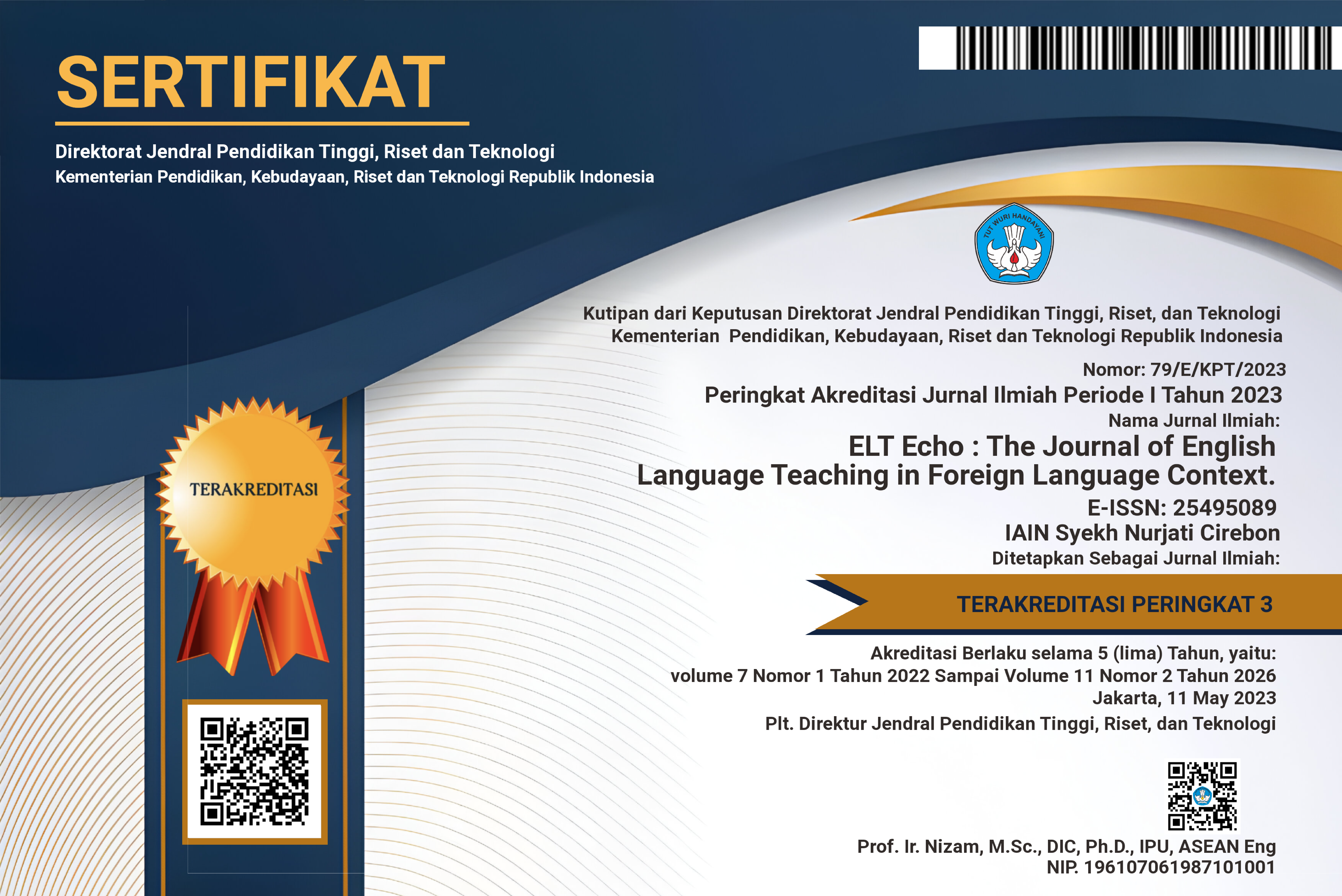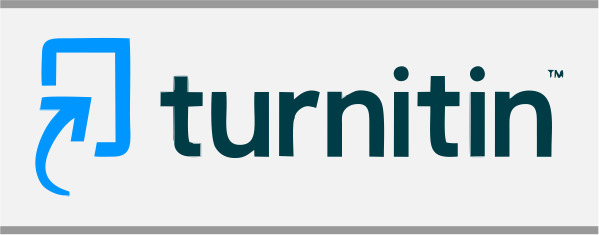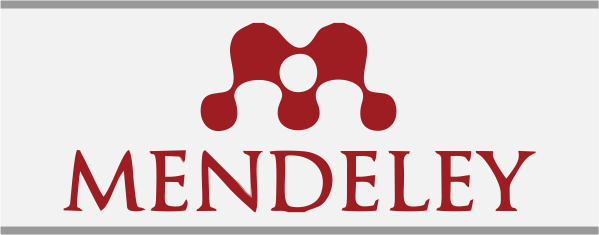Fostering Autonomous Learning Through Peer Feedback
(1) IAIN Syekh Nurjati
(2) Universitas Sebelas Maret
(*) Corresponding Author
Abstract
Keywords
Full Text:
PDFReferences
Azarnoosh, M. (2013). Peer assessment in an EFL context: attitudes and friendship bias. http://www.languagetestingasia.com/content/3/1/11
Benson, P. (2013). Teaching and Researching: Autonomy in Language Learning. Routledge. https://doi.org/10.4324/9781315833767
Boud, D., & Falchikov, N. (2006). Aligning assessment with long-term learning. Assessment and Evaluation in Higher Education, 31(4), 399–413. https://doi.org/10.1080/02602930600679050
Boud, D., & Molloy, E. (2013). Rethinking models of feedback for learning: The challenge of design. Assessment and Evaluation in Higher Education, 38(6), 698–712. https://doi.org/10.1080/02602938.2012.691462
Chen, Q., May, L., Kalinowski, V., & Kettle, M. (2014). The enactment of formative assessment in English language classrooms in two Chinese universities: Teacher and student responses. Assessment in Education: Principles, Policy and Practice, 21(3), 271–285. https://doi.org/10.1080/0969594X.2013.790308
Cheng, W., & Warren, M. (2005). Peer assessment of language proficiency. Language Testing, 22(1), 93–121. https://doi.org/10.1191/0265532205lt298oa
Falchikov, N. (2003). Learning Together. Routledge. https://doi.org/10.4324/9780203451496
Habeb Al-Obaydi, L., Pikhart, M., & Klimova, B. (2023). Verifying EFL Autonomous Learning by Digital Gaming: Definitions and Concepts. International Journal of Emerging Technologies in Learning (IJET), 18(05), 253–260. https://doi.org/10.3991/ijet.v18i05.36617
Hollweck, T. (2016). Robert K. Yin. (2014). Case Study Research Design and Methods (5th ed.). Thousand Oaks, CA: Sage. 282 pages. The Canadian Journal of Program Evaluation. https://doi.org/10.3138/cjpe.30.1.108
Hoo, H. T., Deneen, C., & Boud, D. (2022). Developing student feedback literacy through self and peer assessment interventions. Assessment and Evaluation in Higher Education, 47(3), 444–457. https://doi.org/10.1080/02602938.2021.1925871
Hyland, K. (n.d.). Scientific writing Cite this paper.
Hyland, K., & Diani, G. (2009). Introduction: Academic Evaluation and Review Genres. In Academic Evaluation (pp. 1–14). Palgrave Macmillan UK. https://doi.org/10.1057/9780230244290_1
Hyland, K., & Salager-Meyer, F. (2009). Scientific writing. Annual Review of Information Science and Technology, 42(1), 297–338. https://doi.org/10.1002/aris.2008.1440420114
Iraji, H. R., Enayat, M. J., & Momeni, M. (2016). The Effects of Self- and Peer-assessment on Iranian EFL Learners’ Argumentative Writing Performance. Theory and Practice in Language Studies, 6(4), 716. https://doi.org/10.17507/tpls.0604.08
J. Topping, K. (2017). Peer Assessment : Learning by Judging and Discussing the Work of Other Learners. Interdisciplinary Education and Psychology, 1(1). https://doi.org/10.31532/interdiscipeducpsychol.1.1.007
Jin, X., Jiang, Q., Xiong, W., Feng, Y., & Zhao, W. (2022). Effects of student engagement in peer feedback on writing performance in higher education. Interactive Learning Environments. https://doi.org/10.1080/10494820.2022.2081209
Kartika Putra, T., Fikky Abdullah, D., & Sebelas Maret Surakarta, U. (2019). Higher-Order Thinking Skill (HOTs) Questions in English National Examination in Indonesia. The Journal of Educational Development JED, 7(3), 178–185. http://journal.unnes.ac.id/sju/index.php/jed
Patchan, M. M., Schunn, C. D., & Clark, R. J. (2018). Accountability in peer assessment: examining the effects of reviewing grades on peer ratings and peer feedback. Studies in Higher Education, 43(12), 2263–2278. https://doi.org/10.1080/03075079.2017.1320374
Su, W., & Huang, A. (2022). More enjoyable to give or to receive? Exploring students' emotional status in their peer feedback on academic writing. Assessment and Evaluation in Higher Education, 47(7), 1005–1015. https://doi.org/10.1080/02602938.2021.2004389
Widodo, H. P. (2013). Implementing Collaborative Process-Based Writing in the EFL College Classroom. Research Papers in Language Teaching and Learning, 4(1), 198–206.
Winstone, N., & Charles, D. (2020). Designing Effective Feedback Processes in Higher Education. Routledge.
Wu, Y., & Schunn, C. D. (2020). When peers agree, do students listen? The central role of feedback quality and feedback frequency in determining uptake of feedback. Contemporary Educational Psychology, 62. https://doi.org/10.1016/j.cedpsych.2020.101897
Yang, M., Badger, R., & Yu, Z. (2006). A comparative study of peer and teacher feedback in a Chinese EFL writing class. Journal of Second Language Writing, 15(3), 179–200. https://doi.org/10.1016/j.jslw.2006.09.004
Yu, S., & Hu, G. (2017). Can higher-proficiency L2 learners benefit from working with lower-proficiency partners in peer feedback? Teaching in Higher Education, 22(2), 178–192. https://doi.org/10.1080/13562517.2016.1221806
Yusoff, W. M. W., & Seman, S. C. (2018). Teachers’ Knowledge of Higher Order Thinking and Questioning Skills: A Case Study at a Primary School in Terengganu, Malaysia. International Journal of Academic Research in Progressive Education and Development, 7(2). https://doi.org/10.6007/ijarped/v7-i2/4120
Zhao, H. (2010). Investigating learners’ use and understanding of peer and teacher feedback on writing: A comparative study in a Chinese English writing classroom. Assessing Writing, 15(1), 3–17. https://doi.org/10.1016/j.asw.2010.01.002
Zhao, H. (2018). New insights into the process of peer review for EFL writing: A process-oriented sociocultural perspective. Learning and Instruction, pp. 58, 263–273. https://doi.org/10.1016/j.learninstruc.2018.07.010
DOI: 10.24235/eltecho.v8i1.13612
Article Metrics
Abstract view : 77 timesPDF - 12 times
Refbacks
- There are currently no refbacks.
Â
This Journal is indexed by:
Â

This work is licensed under a Creative Commons Attribution 4.0 International License.










